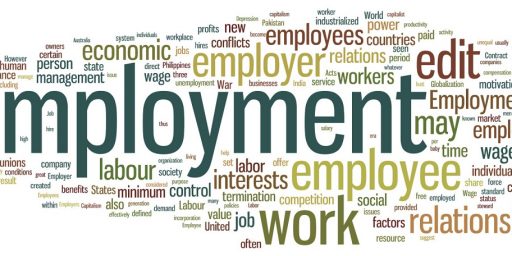Is Surfing During Work Stealing?
If you're reading this at the office, are you stealing from your boss?
In closing this morning’s post, “Newspapers Suck Less Than You Think,” I snarked, “Rather than paying for a newspaper and reading it at home, people can now get it for free and get paid to read it on their office computers!”
It was mostly a throwaway line but doubtless one with a large kernel of truth. Certainly, OTB’s traffic spikes during the 9-5 Eastern time period weekdays and plummets thereafter.
Commenter grampagravy retorted,
People who read the paper, online or otherwise, on my dime got walking papers. Personal pursuits while on the clock is stealing. I’ve always been amazed by the number of “honest” people who think its okay to sell someone an hour and then steal a portion of it back.
To which JKB responded,
An appropriate view if your employees are hourly but veering toward making them non-exempt if they are salaried.
It’s an interesting question, really, and one that’s becoming increasingly harder to answer in the information-service economy.
For an old-time factory worker, it was pretty obvious what you were supposed to be doing. You had a highly defined repetitive task and were expected to do that unless you were on an allotted break.
For an office worker in the pre-Internet age, the lines blurred a bit. Some amount of hanging out by the water cooler, taking smoke breaks (especially once they made it illegal to smoke at your desk) and otherwise goofing off was considered acceptable — even socially desirable to demonstrate being a “team player” — but people were expected to spend the vast majority of their time working on various projects for the firm.
The Internet has made that a little bit more complicated. Smart managers understand that workers can’t be expected to stare at their screens eight hours a day concentrating on their work. The occasional peek at ESPN or Drudge or YouTube or HuffPo or whatever is not only reasonable but likely to render the worker more productive. Up to a point, of course.
For those of us in the information business, though, it’s off-the-charts complicated. Pretty much anything that a college professor or writer or journalist reads provides potential insights that are useful for their jobs.
Beyond that, JKB is right: The personal and professional blur in the “exempt” world. For those of us in jobs where we’re expected to be routinely available via email and cell phone evenings, weekends, vacations, holidays, and so forth because others are up against deadlines and need a few minutes of our time occasionally, it’s not unreasonable to expect in return some flexibility during working hours.







A very interesting question.
In my case, I’m paid hourly and I admit to some personal-surfing on the clock. However, 1) my boss knows this and 2) I work in press publication, so when I have a deadline coming up, you can bet your ass I’ll be doing plenty of off-the-clock work to make sure all the pages are set correctly and that the publication will go out on time. As Mr. Joyner wrote, this can be a normal give-and-take for “those of us in jobs where we’re expected to be routinely available via email and cell phone evenings, weekends, vacations, holidays, and so forth”.
If I spend 40 additional hours off the time clock working on the publication (usually this is during a press week), I don’t feel ripped off. As an employee of a small publication, the quality of the completed product matters to me because the health and reputation of the company matters to me. It’s not just that, either: when I’m creating a publication, it’s not just labor that translates into man-hours, then money, then rent/tech/beer at the end of the week, it’s something tangible that goes into my career portfolio for the rest of my life.
I know that not everyone has the same relationship with their work, so in general, I think the most important parts of this equation are:
1) Do you specifically “hide” your personal surfing from your superiors? Kind of a telling sign.
2) Do you surf when something is burning a hole in your inbox? Again, not cool.
Outside of those points, it’s kind of a grey area. In terms of those grey areas, it’s obviously helpful for employees to know exactly what their employers expect of them in terms of internet use. Even in the internet age, I’d say there are still plenty of jobs where Grampagravy’s view is an acceptable one–provided the employees are made to understand the expectation.
For sure. My job, for example, requires a lot of phone time, but between calls, there really is nothing else to do but browse the web.*
*There’s a handful of “make-work” stuff, like shredding old documents several years’ old, but the time urgency of it is almost zero.
Before this spirals out of control, let me say my comment was imprecise. The difference isn’t between an hourly and salaried employee but rather between exempt and non-exempt under FLSA. An employer exercising tight minute by minute control of an exempt employee could find themselves with a huge back pay issue if the employee challenges that they treated and their job has become like that of a non-exempt employee.
More specifically I was thinking of this when I made the comment:
That, of course, would not prevent the disciplining of an employee whose did not accomplish their work be it due to surfing or any thing else. Nor the imposition of a work rule about the use of company resources.
This is a problem resolved at the work place. If employers want to block access to sites, its their network and their machines, much like rules limiting personal calls at work. All we can ask is that it be spelled out and fairly enforced.
Any competent network administrator is able to restrict access as management directs. so, this should not be a problem.
The ability to surf at work can be the difference between someone staying at their job and leaving so that the employer has to then train someone new. Walt is absolutely right that employers can block anything that they want and that they should be clear about what the policies are (and they should be fairly enforced), but employers should realize that it’s a give-and-take situation. One former employer of mine lost two Employees of the Month due to an ill-conceived web policy and had a lot of other quality employees trying to find work elsewhere.
One of my clients recently installed employee monitoring software and learned to their horror how many of their employees were spending all day, every day on shopping and entertainment sites. A number of employees were terminated.
It seems to me that a little theft is the cost of doing business but one should expect one’s employees to be discrete and exercise at least a little self-control.
When I was a stockbroker I learned to surf and I then when I realized the value to my job, I surfed to learn. Information is key to knowing and investing.
When I returned to teaching – I discovered the same thing – only that was done with the kids to show how to get info on just about anything by surfing.
One of my clients recently installed employee monitoring software and learned to their horror how many of their employees were spending all day, every day on shopping and entertainment sites. A number of employees were terminated.
In an ideal world, if it was affecting their job it wouldn’t have gone unnoticed. Some jobs just aren’t like that, though. Sometimes it’s hard to tell when someone is or isn’t doing a good job. Seems to me, though, that sort of thing ought to be the last resort. Or the sort of thing that you document when you already want to fire someone. Of course, that runs contrary to fair enforcement. Hmmm.
I still consult a little. When I’m in the office I try to subtract surf-time from work time, billing hourly.
I guess the insidious thing is when a “sanity break” stretches a little long, or really takes your mind off the work-problem.
http://xkcd.com/303/